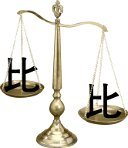Simple comparisons in Mandarin Chinese
 One of the most useful structures you can learn in Mandarin Chinese is comparing things with 比 (bǐ). It doesn’t take long to master the basics, and once you have it opens up countless useful sentences.
One of the most useful structures you can learn in Mandarin Chinese is comparing things with 比 (bǐ). It doesn’t take long to master the basics, and once you have it opens up countless useful sentences.
To 比 or not to 比
English has a variety of ways to make comparisons; the -er suffix, “more” and special instances like “better”, for example. In Mandarin, these are all covered by 比.
The basic structure is
[noun 1] 比 [noun 2] [adj]
The equivalent of this in English is
[noun 1] is more [adj] than [noun 2]
So whenever you want to compare two things, you’ll need 比 in between them. One way to think of it is that 比 is a pair of scales, with the nouns being weighed on either side. Another way is to think of 比 as “beat” (as they sound similar), giving you something like “[noun 1] beats [noun 2] at being [adj]”.
Some real examples
我的车比你的车快。 Wǒ de chē bǐ nǐ de chē kuài My car is faster than your car.
我的房子比你的大。 Wǒ de fángzi bǐ nǐ de dà My house is bigger than yours. _(Notice that you don't need to repeat the objects being compared.)_
我比你酷。 Wǒ bǐ nǐ kù I’m cooler than you.
And if somebody starts saying things like that to you, you can always come back with
我比你客气。 Wǒ bǐ nǐ kèqì I’m more polite than you.
